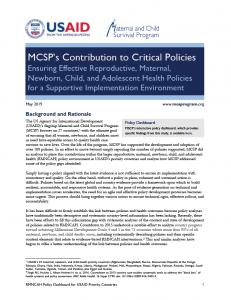
The US Agency for International Development (USAID) flagship Maternal and Child Survival Program (MCSP) focuses on 27 countries, with the ultimate goal of ensuring that all women, newborns and children most in need have equitable access to quality health care services. Over the life of the program, MCSP has supported the development and adoption of over 100 policies. In an effort to move beyond reporting the number of policies supported, MCSP did an analysis to place this contribution within the larger reproductive, maternal, newborn, child and adolescent health (RMNCAH) policy environment in USAID priority countries, analyzing how the program addressed some of the policy gaps identified.
Having a policy aligned with the latest evidence is not sufficient to ensure its implementation with consistency and quality. On the other hand, without a policy in place, coherent and sustained action is difficult. Policies based on the latest global and country evidence provide a framework upon which to build resilient, accountable and responsive health systems. As the pace of evidence generation on technical and implementation issues accelerates, the need for agile and effective policy development processes become more urgent, bringing together various actors to ensure technical rigor, effective rollout and accountability.
It has been difficult to firmly establish the link between policies and health outcomes because policy analyses have traditionally been descriptive and systematic country-level information has been lacking. Recently, there have been efforts to fill this information gap with systematic analyses of the content and state of development of policies related to RMNCAH. Countdown to 2015 undertook a notable effort to analyze country progress toward achieving Millennium Development Goals 4 and 5 in the 75 countries where more than 95% of all maternal, newborn, and child deaths occur, including systematically describing policies and their specific content elements that relate to evidence-based RMNCAH interventions. This and similar analyses have begun to offer a better understanding of the link between policies and health outcomes.
The interactive policy dashboard, which provides specific findings from this study, is available here.